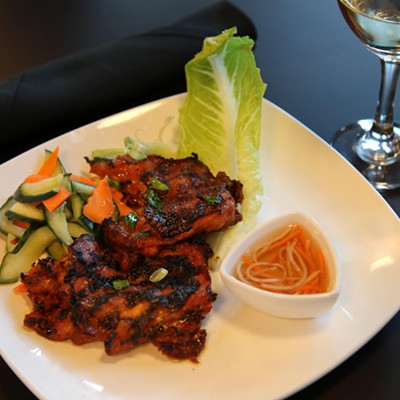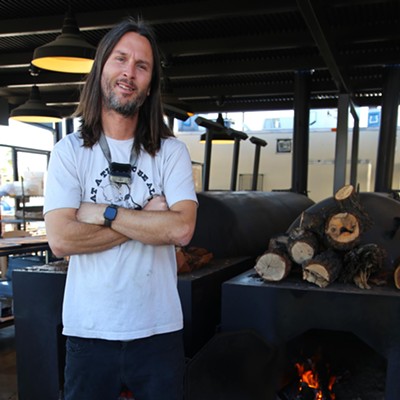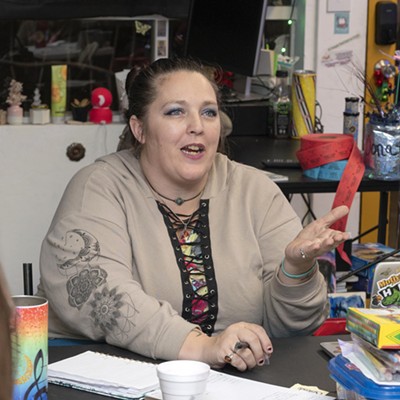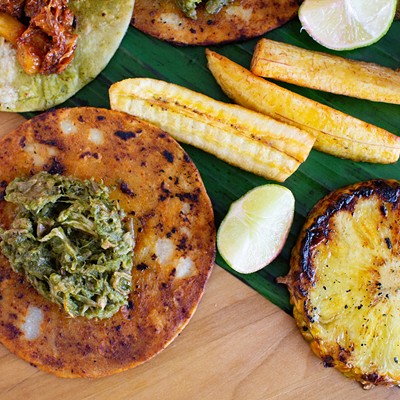When people are forced to leave their native countries, they always keep a piece of their culture.
Whatever the reasons are for their departure—from political persecution to the ache to escape poverty—immigrants constantly look for ways to keep their traditions alive. But as hard as they try, nothing can truly replace the warmth of loved ones, the comfort of hearing their native language on the streets, and that sense of belonging.
Sandra Sanchez, owner of Maya Quetzal, at 429 N. Fourth Ave., fled Guatemala in the mid-1980s, during the peak years of the country's violent civil war. Her journey was filled with obstacles, and it has taken Sanchez years to adapt to these foreign grounds. However, the food she serves at Maya Quetzal is a reflection of the Guatemalan traditions she remembers and misses the most.
Sanchez was born in Chiquimula, about two hours away from Guatemala City. Despite growing up poor, the daughter of a farmer and a seamstress remembers her childhood with love.
"I thank God for having been born where I was born," says Sanchez. "We were a very poor family, but I recall nothing but laughter and joyful moments."
Nowadays, her parents live in Guatemala City. Sanchez tries to visit at least once every couple of years, but money is always a struggle.
"My parents are 90-something years old. I am so blessed to still have them around," Sanchez says. "They are older now, and living so far away. I know that I can receive a phone call with bad news any minute."
Sanchez's mother, especially, is a strong influence in Sanchez's life and in her cooking. Just like any other mother, she assigned her children different chores every day. Sometimes, they had to help the matriarch clean the house; on other days, they had to help her with the cooking. When Sanchez was assigned to cook, her mother would teach her different Guatemalan recipes.
"My mom has magical hands in the kitchen," Sanchez says. "As much as I love to cook, I probably will never be able to give my mom's angelic touch to the food."
All the dishes Sanchez serves at Maya Quetzal derive from her mother's teachings and have roots in Sanchez's favorite Guatemalan and family traditions.
As Sanchez points at the pepián (a red-chili- and tomato-based sauce) and jocón (a sauce with green tomato, coriander and green bell pepper) dishes on the menu, she remembers her mother would make chicken with jocón, and pork with pepián for the whole family at celebrations. These two sauces are distinct to Guatemalan cuisine, and they're two of Sanchez's favorites to make for her customers.
"Sometimes, I put pumpkin seeds in them, because that is how my mom used to do it," Sanchez says.
When she talks about the tamales and paches—tamales made from potatoes—she begins to talk about Christmastime in Guatemala, which is when families often eat the dishes, paired with homemade ponche, which is warm fruit punch.
"I miss Christmases there," Sanchez says. "I miss staying up until late on Christmas Eve, praying with my family at midnight, watching the fireworks and then eating my mom's tamales."
When it comes to Guatemalan festivities, December is definitely Sanchez's favorite month. One of her most-loved traditions is called la quema del diablo, or the burning of the devil. The tradition is unique to Guatemala, and it takes place every year on Dec. 7. La quema del diablo is a ritual for spiritual cleansing. It is a custom for people to gather trash from their homes and set it on fire, symbolizing the ridding of bad energy that had been trapped inside their homes.
"I still have a similar ceremony here for la quema del diablo," Sanchez says. "Of course, I don't go to the streets and burn trash. I burn incense around the house instead."
As she looks back at this tradition, thoughts of her mother's cooking emerge again.
"After we burnt the trash, my mom would feed us jocotes soaked in honey, and torrejas," Sanchez says. She has made these two desserts at Maya Quetzal, but only during certain times of the year. Torrejas are a Latin American version of French toast, and jocote is a fruit similar to plums. Sanchez speaks of these traditions with great joy. The tears in her eyes start to dry, and a smile takes over her face, as she remembers her life prior to fleeing Guatemala.
"I was accustomed to feeling like I belonged. I was accustomed to being surrounded by my family and my culture," Sanchez says. "I came to a foreign country, where everything was so different. It was a big shock."
Guatemala had a civil war that lasted 36 years. The war began after the CIA ignited a coup d'état against the Guatemalan government because of its alleged communist ideals. Shortly after that, guerillas started an uprising that would last for more than three decades. They fought for economic equality, as well as civil rights for farmers, and equal rights for the indigenous population.
Sanchez and her then-husband worked with an organization that aided various indigenous villages and farmers' syndicates. At the time, the government led a huge witch hunt, searching for anyone who was involved with guerrilla groups or any leftist organizations.
It didn't take long for the militia to come banging on Sanchez's door. However, the couple managed to escape with their children. After a few months living near the Guatemala-Mexico border, Sanchez and the rest of her family moved back to Guatemala City after hearing news that the government would grant them amnesty. This promise turned out to be a trap.
"My husband was kidnapped by the army two weeks after we moved back to Guatemala City," Sanchez says. "Six months later, he came home with cigarette burns and knife cuts all over his body. We knew they would come for us again, so that night, my father drove us to a border town in Southern Mexico, and we escaped."
Sanchez refers to that day as a turning point in her life. Her time in Mexico was filled with uncertainty. She had countless sleepless nights.
When the U.S. finally granted them political asylum, it took the family a few years to settle and start a new life.
"Through my journey, I always stumbled upon angels who helped me overcome so many obstacles," Sanchez says. "This restaurant is how I keep my traditions alive and close to my heart."
Through the years, Maya Quetzal has attracted a big following. But lately, business is slow because of the streetcar construction on Fourth Avenue. Sanchez hopes everything will pick up again, so she can keep her Guatemalan food and traditions alive in Tucson.
"There are so many people who love us and have given us their support," Sanchez says. "I want to bring more Guatemalan dishes and crafts to share with everyone here. I became a U.S. citizen, but my heart is still 100 percent Guatemalan."








